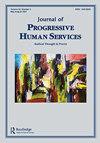Investing in People and Communities for Social Change: Lessons from Social Enterprises in South Africa
IF 0.8
Q1 SOCIAL WORK
引用次数: 5
Abstract
ABSTRACT Irrefutably, many countries of the developing world continue to exhibit economic investments culture primarily premised on maximizing profit and accumulating wealth for oneself. Through this phenomenon, inequality has been glaring, with rich individuals becoming richer, while the majority poor continue to languish in poverty and their human dignity being highly compromised. South Africa as a country battling with pernicious legacies of apartheid presents such a good example. The country experiences a high level of gender inequality, poverty, a culture of violence, and unemployment of women and youth. In the awake of these predicaments, we need to question the dominant exorbitant profit-making investment approaches that undermine people’s dignity, freedom and self-value. This paper presents findings from social enterprises to gain insights and lessons on doing business differently. The findings are presented using a conceptual framework abbreviated as ‘SISTER’; S – Service; I – Integrity; S – Sustainability; T – Teamwork; E – Excellence; R – Respect. The study emphasizes that, investing in people has to take a paradgim shift by adopting distinctive models aganist the current capitalistic philosophies. The paper emphasis on focusing on peoples' values, capabilities, talents and cultural richness to generate wealth for societal and individual development, and thus lessening the ramifications associated with self-centredness of economic investment.投资于人和社区促进社会变革:来自南非社会企业的经验教训
无可辩驳的是,许多发展中国家的经济投资文化继续以利润最大化和为自己积累财富为主要前提。通过这种现象,不平等现象变得十分明显,富人变得更加富有,而大多数穷人继续在贫困中挣扎,他们的人格尊严受到严重损害。南非作为一个与种族隔离的有害遗产作斗争的国家就是这样一个很好的例子。该国经历了高度的性别不平等、贫困、暴力文化以及妇女和青年失业。在意识到这些困境时,我们需要质疑占主导地位的过度盈利的投资方式,这种方式损害了人们的尊严、自由和自我价值。本文介绍了社会企业的调查结果,以获得不同经营方式的见解和教训。研究结果使用缩写为“SISTER”的概念框架提出;S -服务;I -诚信;S -可持续发展;T -团队合作;E -卓越;R——尊重。该研究强调,对人的投资必须进行范式转换,采用不同于当前资本主义哲学的独特模式。本文强调关注人的价值观、能力、才能和文化丰富性,为社会和个人发展创造财富,从而减少与经济投资以自我为中心相关的后果。
本文章由计算机程序翻译,如有差异,请以英文原文为准。
求助全文
约1分钟内获得全文
求助全文
来源期刊

Journal of Progressive Human Services
SOCIAL WORK-
CiteScore
3.20
自引率
8.30%
发文量
14
期刊介绍:
The only journal of its kind in the United States, the Journal of Progressive Human Services covers political, social, personal, and professional problems in human services from a progressive perspective. The journal stimulates debate about major social issues and contributes to the development of the analytical tools needed for building a caring society based on equality and justice. The journal"s contributors examine oppressed and vulnerable groups, struggles by workers and clients on the job and in the community, dilemmas of practice in conservative contexts, and strategies for ending racism, sexism, ageism, heterosexism, and discrimination of persons who are disabled and psychologically distressed.
 求助内容:
求助内容: 应助结果提醒方式:
应助结果提醒方式:


